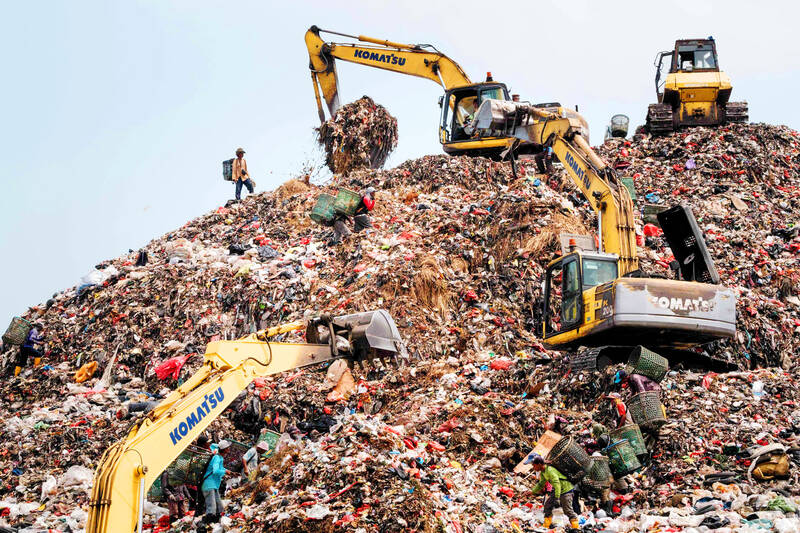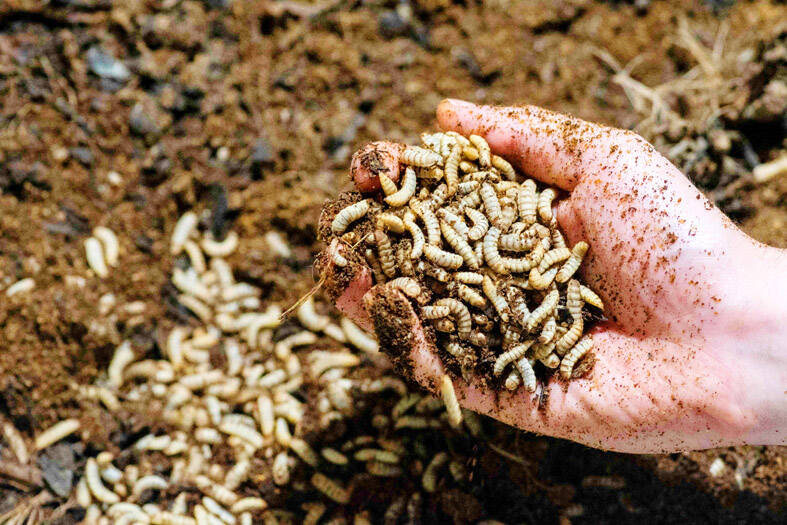Indonesian maggot farmer Rendria Labde spoils his black soldier flies with tasty treats and no wonder: To him, they are warriors fighting an urgent battle against the mounds of food waste threatening to spill over from Jakarta’s landfill.
Most of the rubbish from the city of more than 10 million people, including food waste, ends up in the Bantar Gebang landfill in Bekasi, a nearby satellite city.
Yet Labde had a better idea — feed the discarded food to his black soldier flies and then sell dried maggots to animal and fish feed makers, so he founded Magalarva.

Phtoo: AFP
“Being a city boy, I looked around at what is the biggest problem in the city. I needed to do something about the waste,” said Labde, who launched Magalarva in 2018 and goes by the nickname “fly guy.”
Magalarva collects food waste, which is then sorted at its facility and used as a feed source for black soldier fly larvae. The bioconversion process converts food waste into high-protein body mass of larvae and organic fertilizers.
Today, the company takes in 5 to 6 tonnes of food waste per day and produces about 250kg of dried larva.

Photo: AFP
It all started in 2016 when Labde decided to find out more about his own trash trail by following it to Bantar Gebang, a “monumental” moment that left him awed by the landfill’s size and how badly maintained it was.
As Jakarta’s wealth and population have soared in the past few years, vital infrastructure such as rubbish collection and recycling services have struggled to keep pace.
Many Indonesian cities rely on informal scavengers to keep streets clean, with valuable trash separated and sometimes recycled, while the rest is often burned by roadsides or thrown into waterways where it can cause flooding or wash downstream to blight coastal areas of the archipelago.
Most of the rest of the rubbish ends up at landfill sites, which globally account for about 11 percent of methane emissions. This is expected to rise about 70 percent by 2050 as the world’s population continues to climb, the World Bank has said.
“Poorly designed landfills can contaminate groundwater and emit GHGs [greenhouse gases] into the atmosphere,” said Nick Jeffries, a senior expert at the Ellen MacArthur Foundation, a nonprofit that works toward creating a global circular economy.
Landfill fires also affect human health, he added.
These dangers were all too apparent to Labde when he visited Bantar Gebang, where piles of garbage rise 50m into the air, and which officials say could reach maximum capacity within two years.
“All countries around the world are doing landfill as well, but why are we the worst?” the 32-year-old asked as he sat in his fly farm’s office, which was cluttered with bags of dried maggots.
Opened in 1989, the Bantar Gebang dump used by Jakarta covers more than 81 hectares and is the capital’s only landfill and Southeast Asia’s largest.
About 100 bulldozers and 800 people work on the massive site where 90 percent of the city’s waste ends up.
About 6,000 informal workers also roam the soaring mountains of trash, searching for anything that has value to take to recycling sites outside.
During the dry season fires regularly break out, while rain during the monsoon can cause mounds of trash to collapse and spill outside the landfill’s boundaries.
Last year, Bantar Gebang took in 7,500 tonnes of waste per day, up from 6,400 tonnes in 2015, said a landfill official, who asked not to be named because they are not authorized to speak to the media.
Organic material, such as food and garden waste, accounted for 50 percent, plastics made up 23 percent and paper 17 percent, he said.
“In two years, if the condition is the same, we will reach our maximum capacity,” he said, adding that there is “no plan” in place if that happened.
There are about 2,000 recycling facilities in Jakarta and households are encouraged to separate their waste and use recycling collection points.
However, home collection services are few and businesses are responsible for managing their own waste, with some waste management firms illegally dumping trash.
A government ban on single-use plastic bags in malls, and street and wet markets in Jakarta is also poorly enforced.
Mohamad Bijaksana Junerosano is the founder and CEO of Waste4Change, which collects waste for a fee and takes it to four small recycling sites across the country, including one near Bantar Gebang.
Junerosano, who has about 15 years’ experience in the industry, said that Jakarta’s waste issues were caused by lax enforcement of laws, a lack of public-private partnerships and a dearth of fair and proper financing arrangements for responsible waste management.
People in Jakarta have an “out of sight, out of mind” mindset on trash, and with little enforcement, there are “no rules to the game,” said Junerosano.
“The minimum for us to be feasible, it’s like two cups coffee, 60,000 rupiah [US$3.86] per month per household, but the willingness to pay is only 20,000 to 30,000 rupiah,” he said, referring to how much it costs his company to collect a family’s trash.
In 2018, Indonesia generated 65.79 million tonnes of waste, 44 percent of which was food waste, said Mushtaq Memon, coordinator of chemicals and pollution action for Asia-Pacific at the UN Environment Programme.
Of that, 72 percent was managed and 28 percent unmanaged, with 69 percent of the managed waste ending up in landfills and just 12 percent recycled, he said.
“With over half of Indonesia’s population residing in urban environments, waste management in cities is a critical issue for governments, industries and citizens,” Memon said.
Policies to encourage people to separate and sort their waste should be prioritized, food loss and waste should be reduced and scavengers should be trained and supported, he added.
“By providing training to waste pickers to identify and sort waste materials from each other, it is both possible to increase recycling rates and the quality of recyclable materials, as well as improve the incomes of waste pickers,” he said.
Labde has faced his own challenges in trying to become part of the solution. Magalarva has had to move premises three times already — twice because of complaints about the smell.
However, the company has been at its current site for three years now, receiving food waste from a major milk producer, waste collection businesses, waste collection sites used by scavengers, a large wet market and 200 households.
Orders coming in for their high-protein animal feed ingredient are six to eight times current capacity, said Labde, adding that he hopes to expand when he has the capital to do so.
“I love flies. What they’re doing with processing all the waste... I’ll always be grateful for them... It’s the circle of life,” he said.

Semiconductor business between Taiwan and the US is a “win-win” model for both sides given the high level of complementarity, the government said yesterday responding to tariff threats from US President Donald Trump. Home to the world’s largest contract chipmaker, Taiwan Semiconductor Manufacturing Co (TSMC, 台積電), Taiwan is a key link in the global technology supply chain for companies such as Apple Inc and Nvidia Corp. Trump said on Monday he plans to impose tariffs on imported chips, pharmaceuticals and steel in an effort to get the producers to make them in the US. “Taiwan and the US semiconductor and other technology industries

SMALL AND EFFICIENT: The Chinese AI app’s initial success has spurred worries in the US that its tech giants’ massive AI spending needs re-evaluation, a market strategist said Chinese artificial intelligence (AI) start-up DeepSeek’s (深度求索) eponymous AI assistant rocketed to the top of Apple Inc’s iPhone download charts, stirring doubts in Silicon Valley about the strength of the US’ technological dominance. The app’s underlying AI model is widely seen as competitive with OpenAI and Meta Platforms Inc’s latest. Its claim that it cost much less to train and develop triggered share moves across Asia’s supply chain. Chinese tech firms linked to DeepSeek, such as Iflytek Co (科大訊飛), surged yesterday, while chipmaking tool makers like Advantest Corp slumped on the potential threat to demand for Nvidia Corp’s AI accelerators. US stock

The US Federal Reserve is expected to announce a pause in rate cuts on Wednesday, as policymakers look to continue tackling inflation under close and vocal scrutiny from US President Donald Trump. The Fed cut its key lending rate by a full percentage point in the final four months of last year and indicated it would move more cautiously going forward amid an uptick in inflation away from its long-term target of 2 percent. “I think they will do nothing, and I think they should do nothing,” Federal Reserve Bank of St Louis former president Jim Bullard said. “I think the

SUBSIDIES: The nominee for commerce secretary indicated the Trump administration wants to put its stamp on the plan, but not unravel it entirely US President Donald Trump’s pick to lead the agency in charge of a US$52 billion semiconductor subsidy program declined to give it unqualified support, raising questions about the disbursement of funds to companies like Intel Corp and Taiwan Semiconductor Manufacturing Co (台積電). “I can’t say that I can honor something I haven’t read,” Howard Lutnick, Trump’s nominee for commerce secretary, said of the binding CHIPS and Science Act awards in a confirmation hearing on Wednesday. “To the extent monies have been disbursed, I would commit to rigorously enforcing documents that have been signed by those companies to make sure we get